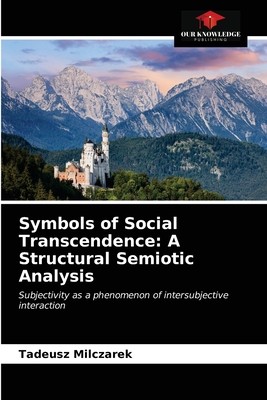
- We will send in 10–14 business days.
- Author: Tadeusz Milczarek
- Publisher: Our Knowledge Publishing
- ISBN-10: 6203118915
- ISBN-13: 9786203118919
- Format: 15.2 x 22.9 x 0.9 cm, minkšti viršeliai
- Language: English
- SAVE -10% with code: EXTRA
Reviews
Description
This study is devoted to the problem of man's ability to change social reality, which is defined by the concept of subjectivity. It consists in the subject's overcoming of his inner and outer definiteness. Every concrete manifestation of subjectivity is a social transcensus - a leap from a given social certainty to a new quality. The mechanism of subjectivity realization is revealed as an interaction of subject's internal reserves, his free space, and value-normative distance. The research integrates the European and Russian traditions of understanding subjectivity, regarding it as a modus operandi of the subject's creative essence. The book marks the initial stage of the method of structural-semiotic analysis, which the author is developing and which reveals the symbolic side of subjectivity. The study is intended for a wide range of readers, including undergraduate and graduate students, young scholars, teachers and researchers specializing in philosophy, history, social sciences, anthropology, and cultural studies.
EXTRA 10 % discount with code: EXTRA
The promotion ends in 22d.02:14:23
The discount code is valid when purchasing from 10 €. Discounts do not stack.
- Author: Tadeusz Milczarek
- Publisher: Our Knowledge Publishing
- ISBN-10: 6203118915
- ISBN-13: 9786203118919
- Format: 15.2 x 22.9 x 0.9 cm, minkšti viršeliai
- Language: English English
This study is devoted to the problem of man's ability to change social reality, which is defined by the concept of subjectivity. It consists in the subject's overcoming of his inner and outer definiteness. Every concrete manifestation of subjectivity is a social transcensus - a leap from a given social certainty to a new quality. The mechanism of subjectivity realization is revealed as an interaction of subject's internal reserves, his free space, and value-normative distance. The research integrates the European and Russian traditions of understanding subjectivity, regarding it as a modus operandi of the subject's creative essence. The book marks the initial stage of the method of structural-semiotic analysis, which the author is developing and which reveals the symbolic side of subjectivity. The study is intended for a wide range of readers, including undergraduate and graduate students, young scholars, teachers and researchers specializing in philosophy, history, social sciences, anthropology, and cultural studies.


Reviews